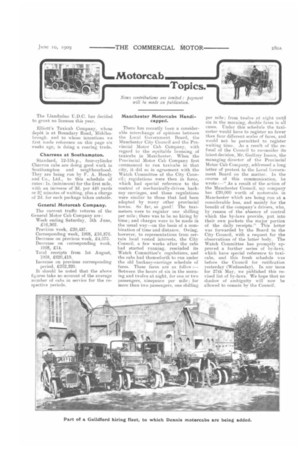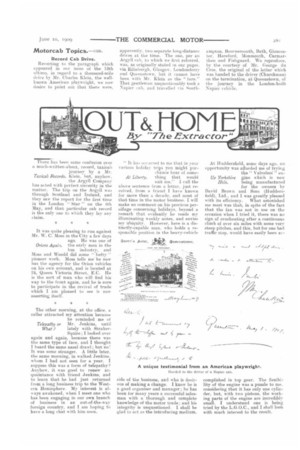Motorcab Topics.
Page 13

Page 15

If you've noticed an error in this article please click here to report it so we can fix it.
News contributions are invited : payment will be made on publication.
The Llandudno U.D.C. has decided to grant no licenses this year.
Elliott's Taxicab Company, whose depot is at Boundary Road, Middlesbrough. and to whose intentions we first made reference on this page six weeks ago, is doing a roaring trade.
Charrons at Southampton.
Standard, 12-15h.p., four-cylinder Charron cabs are doing good work in Southampton and neighbourhood. They are being run by F. A. Hendy and Co., Ltd., to this schedule of rates: is. (minimum) for the first mile, with an increase of 3d. per 440 yards or 31 minutes of waiting, plus a charge of 2d. for each package taken outside.
General Motorcab Company.
The current traffic returns of the General Motor Cab Company are : Week ending Saturday, 5th June, -216,362.
Previous week, 220,437.
Corresponding week, 1908, 216,376. Decrease on previous week, 24,075. Decrease on corresponding week, 1908, 414.
Total receipts from 1st August, 1908, 2626,419.
Increase on previous corresponding period, 2252,320. It, should be noted that the above figures take no account of the average number of cabs in service for the respective periods.
Manchester Motorcabs Handicapped.
There has recently Leen a considerable interchange of opinions between the Local Government Board, the Manchester City Council and the Provincial Motor Cab Company, with regard to the equitable licensing of taxicabs in Manchester. When the Provincial Motor Cab Company first commenced to run taxicabs in that city, it did so in agreement with the Watch Committee of the City Council ; regulations were then in force, which had special reference to the control of mechanically-driven hackney carriages, and these regulations were similar to those that had been adopted by many other provincial towns. So far, so good! The taximeters were to register one shilling per mile; there was to be no hiring by time; and charges were to be made in the usual way—on the basis of a combination of time and distance. Owing, however, to representations from certain local vested interests, the City Council, a few weeks after the cabs had started running, rescinded its Watch Committee's regulations, and the cabs had thenceforth to run under the old hackney-carriage schedule of fares. These fares are as follow :— Between the hours of six in the morning and twelve at, night, for one or two passengers, ninepence per mile for more than two passengers, one shilling
per mile ; from twelve at night until six in the morning, double fares in all cases. Under this schedule the taximeter would have to register no fewer than four different scales of fares, and would not be permitted to register waiting time. As a result of the refusal of the Council to reconsider its latest decision, Mr. Godfrey Isaacs, the managing director of the Provincial Motor Cab Company, addressed a long letter of protest to the Local Government Board on the matter. In the course of this communication, he wrote :—" As a result of the action of the Manchester Council, my company has 220,000 worth of motorcabs in Manchester which are being run at a considerable loss, and mainly for the benefit of the company's drivers, who, by reason of the absence of control which the by-laws provide, put into their own pockets the major portion of the daily receipts." This letter was forwarded by the Board to the City Council, with a request for the observations of the latter body. The Watch Committee has promptly approved a further series of by-laws, which have special reference to taxicabs, and this fresh schedule was before the Council for ratification yesterday (Wednesday). In our issue for 27th May, we published this revised list of by-laws. We hope that no shadow of ambiguity will now be allowed to remain by the Council.
Record Cab Drive. Reverting to the paragraph which ppeared in our issue of the 13th ultimo, in regard to a thousand-mile drive by Mr. Charles Klein, the wellknown American playwright, we now desire to point out that there were,
There has been some confusion over a much-written-about, record, taxicab journey by a Mr. Taxicab Records. Klein, but, anyhow, the Argyll Company has acted with perfect sincerity in the matter. The trip on the Argyll was through Scotland and Ireland, and they saw the report for the first time in the London " Star " on the 4th May, and that particular cab record is the only one to which they lay any
It was quite pleasing to run against Mr. W. C. Moss in the City a few days ago. He was one of
Orions Again. the early men in the bus industry, and Moss and Woodd did some " hefty" pioneer work. Moss tells naehe now has the agency for the Orion vehicles on his own account, and is located at '24, Queen Victoria Street, E.C. He is the sort of man who will find his way to the front again, and he is sure to participate in the revival of trade which I am pleased to see is now asserting itself.
The other morning, at the office, a caller attracted my attention because he reminded me of
Telepathy or Mr. Jenkins, until What ? lately with Straker
Squire ; I looked over again and again, because there was the same type of face, and I thought I heard the same nasal drawl; but no Tt was some stranger. A little later, the same morning, in walked Jenkins, whom I had not seen for a year. I suppose this was a form of telepathy? Anyhow, it was good to renew acquaintance with friend Jenkins, and to learn that he had just returned from a long business trip to the Western Hemisphere. My interest is always awakened, when I meet one who has been engaging in our own branch of business in an out-of-the-way foreign country, and I am hoping to have a long chat with him soon.
apparently, two separate long-distance drives at the time. The one, per an Argyll cab, to which we first referred, was, as originally stated in our pages. via Edinburgh. Glasgow, Londonderry and Queenstown, but it cannot have been with Mr. Klein as the "fare." That gentleman unquestionably took a Napier cab, and travelled via South
" It has occurred to me that in your various holiday trips you might put
At Liberty. thing that would
suit me." I cull the above sentence from a letter, just received, from a friend I have known for more than a decade, and most of that time in the motor business. I will make no comment on his precious persiflage concerning holidays, beyond a remark that evidently he reads my illuminating weekly notes, and envies my ubiquity. However, here is a distinctly-capable man. who holds a responsible position in the heavy-vehicle side of the business, and who is desirous of making a change. I know he is a good organiser and manager ; he has been for many years a successful salesman with a thorough and complete knowledge of the motor trade ; and his integrity is unquestioned. I shall be glad to act as the introducing medium. ampton, Bournemouth, Bath, Gloucester, Hereford, Monmouth, Carmarthen and Fishguard. We reproduce, by the courtesy of Mr. George du Cros, the original of the letter which was handed to the driver (Churchman) on the termination, at Queenstown, of the journey in the London-built Napier vehicle.
At Huddersfield, some days ago, au opportunity was afforded me of trying
the" ValvelesF; 'T en Up Yorkshire gine which is now
being man ufactu red for the owners by David Brown and Sons (Huddersfield), Ltd., and I was greatly pleased with its efficiency. What astonished me most was that, in spite of the fact that the fan was not in use on the occasion when I tried it, there was no sign of overheating after a continuous climb of over six miles with some very steep pitches, and this, but for one bad traffic stop, would have easily been ac complished in top gear. The flexibility of the engine was a puzzle to me. considering that. it has only one cylinder, but, with two pistons, the working parts of the engine are incredibly small. I understand one is being tried by the L.G.O.C., and I shall look with much interest to the result.






















